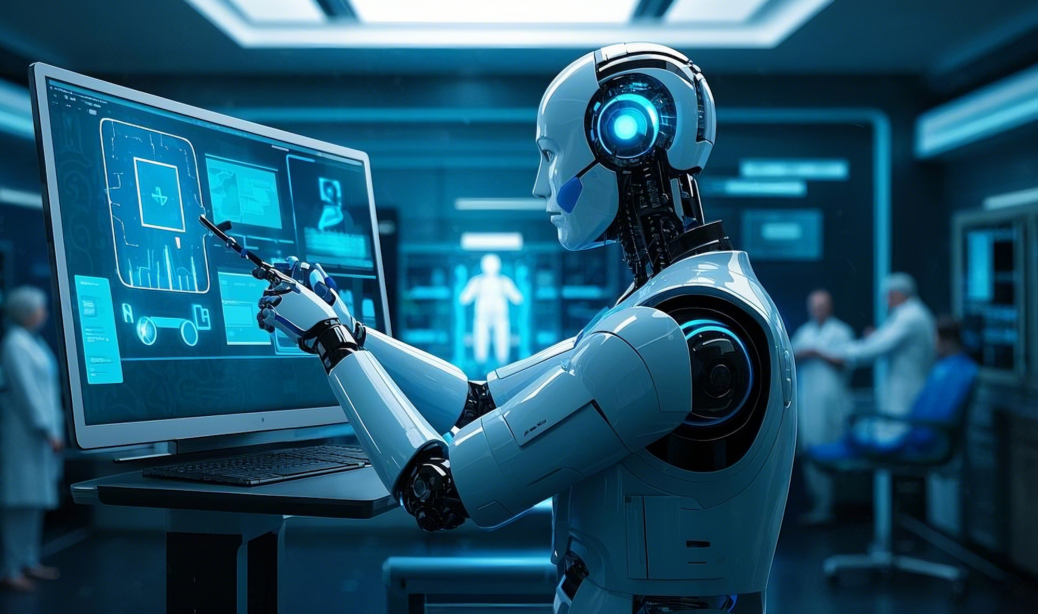Artificial Intelligence (AI) is rapidly transforming healthcare across the globe. From enhancing diagnostics to personalizing treatment, AI-powered solutions are reshaping how medical professionals deliver care. Here’s an overview of the key aspects driving this revolution:
Transformative Applications
- Diagnostics and Imaging:
AI algorithms can analyze medical images—such as X-rays, MRIs, and CT scans—with remarkable speed and accuracy, helping radiologists detect abnormalities and diseases earlier than ever before. - Personalized Treatment:
Machine learning models can tailor treatment plans by analyzing vast amounts of patient data, including genetic information, medical histories, and lifestyle factors. This personalization leads to more effective treatments and better patient outcomes. - Predictive Analytics:
AI-driven predictive analytics help in identifying patients at risk for chronic diseases, enabling early intervention and preventive care. - Virtual Health Assistants:
Chatbots and virtual assistants are providing 24/7 patient support, scheduling appointments, and even offering preliminary medical advice, thereby easing the burden on healthcare providers.
Benefits and Challenges
- Improved Efficiency:
Automation of routine tasks, from administrative work to data analysis, allows healthcare professionals to focus more on patient care. - Enhanced Decision-Making:
With real-time insights and data-driven recommendations, physicians can make better-informed decisions. - Ethical and Privacy Concerns:
Despite its potential, AI in healthcare raises issues related to data security, patient privacy, and the need for robust regulatory frameworks. - Integration and Cost:
Incorporating AI technologies into existing healthcare systems can be challenging due to high initial costs and the need for staff training.
The Future of AI in Healthcare
The future looks promising as AI continues to evolve. Researchers and practitioners are working together to overcome current challenges, with innovations such as explainable AI and improved data governance already on the horizon. As these advancements mature, AI is expected to further enhance clinical outcomes, streamline hospital operations, and ultimately democratize access to quality healthcare.
Call to Action:
Join the conversation on how AI can further transform healthcare. Share your thoughts, experiences, or questions in the comments below!
الذكاء الاصطناعي في مجال الرعاية الصحية: ثورة في عالم الطب
يشهد مجال الرعاية الصحية تحولًا سريعًا بفضل الذكاء الاصطناعي (AI)، حيث تُحدث تقنيات الذكاء الاصطناعي ثورة في الطريقة التي يُشخّص بها الأطباء الأمراض ويقدمون العلاج. وفيما يلي نظرة عامة على الجوانب الرئيسية التي تقود هذه الثورة:
التطبيقات التحولية
- التشخيص والتصوير الطبي:
تستطيع خوارزميات الذكاء الاصطناعي تحليل الصور الطبية مثل الأشعة السينية، والأشعة بالرنين المغناطيسي، والأشعة المقطعية بسرعة ودقة عالية، مما يساعد أخصائيي الأشعة على اكتشاف الحالات المرضية مبكرًا. - العلاج المخصص:
تُمكّن النماذج القائمة على التعلم الآلي من تصميم خطط علاجية مخصصة عبر تحليل كميات هائلة من بيانات المرضى، بما في ذلك المعلومات الجينية والسجلات الطبية وعوامل نمط الحياة. هذا يؤدي إلى تحسين فعالية العلاجات وتحقيق نتائج أفضل للمرضى. - التحليلات التنبؤية:
تساعد التحليلات التنبؤية المدعومة بالذكاء الاصطناعي في تحديد المرضى المعرضين لخطر الإصابة بالأمراض المزمنة، مما يمكّن من التدخل المبكر والرعاية الوقائية. - المساعدون الصحيون الافتراضيون:
توفر الدردشات الذكية والمساعدون الافتراضيون دعمًا على مدار الساعة للمرضى، حيث يقومون بجدولة المواعيد وتقديم النصائح الطبية الأولية، مما يخفف العبء عن مقدمي الرعاية الصحية.
الفوائد والتحديات
- تحسين الكفاءة:
يؤدي أتمتة المهام الروتينية—from الأعمال الإدارية إلى تحليل البيانات—إلى منح الأطباء مزيدًا من الوقت للتركيز على رعاية المرضى. - تعزيز اتخاذ القرارات:
مع تقديم رؤى فورية وتوصيات مستندة إلى البيانات، يمكن للأطباء اتخاذ قرارات مستنيرة بشكل أفضل. - المخاوف الأخلاقية والخصوصية:
بالرغم من إمكاناته الهائلة، يثير الذكاء الاصطناعي في الرعاية الصحية قضايا تتعلق بأمن البيانات وخصوصية المرضى والحاجة إلى أطر تنظيمية قوية. - التكامل والتكلفة:
يُعد دمج تقنيات الذكاء الاصطناعي في الأنظمة الصحية القائمة تحديًا بسبب التكاليف الأولية العالية والحاجة لتدريب الكوادر.
مستقبل الذكاء الاصطناعي في الرعاية الصحية
يبدو المستقبل واعدًا مع استمرار تطور الذكاء الاصطناعي. يعمل الباحثون ومقدمو الرعاية الصحية معًا للتغلب على التحديات الحالية، ومن المتوقع أن تسهم الابتكارات مثل الذكاء الاصطناعي القابل للتفسير وتحسين إدارة البيانات في تعزيز النتائج السريرية وتبسيط عمليات المستشفيات، مما يساهم في توفير رعاية صحية عالية الجودة لجميع شرائح المجتمع.
الدعوة للمشاركة:
انضموا إلى النقاش حول كيفية تعزيز دور الذكاء الاصطناعي في تحسين الرعاية الصحية. شاركونا تجاربكم وآرائكم أو استفساراتكم في التعليقات أدناه!






